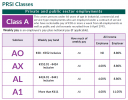Hi everyone,
Nominally as a marketing assignment* at Dublin Business School (but also for my own benefit), I'm looking into retirement planning for women. Specifically, mothers/carers who have taken time out or reduced their hours to raise kids or mind a loved one and are now back in the workforce with, say, 20+ years to retirement. Would these be the initial steps to take:
Also, if anyone is up for being interviewed, I would LOVE to chat about this topic in more detail.
Thanks a million,
Karina
* The assignment is marked on presenting findings in an online format and is not graded on the financial planning element. (This is my own topic of interest.)
Nominally as a marketing assignment* at Dublin Business School (but also for my own benefit), I'm looking into retirement planning for women. Specifically, mothers/carers who have taken time out or reduced their hours to raise kids or mind a loved one and are now back in the workforce with, say, 20+ years to retirement. Would these be the initial steps to take:
- Check current PRSI contributions status
- Acknowledging new shift to Total Contributions, see if current salary meets PRSI contributions thresholds. (Fun fact: my own part-time wages aren't even close. Do employer contributions count towards the 520?)
- Panic.
- Divert additional funds into PRSA or employer pension.
OR
Make additional paid PRSI contributions or plan to.
Also, if anyone is up for being interviewed, I would LOVE to chat about this topic in more detail.
Thanks a million,
Karina
* The assignment is marked on presenting findings in an online format and is not graded on the financial planning element. (This is my own topic of interest.)
